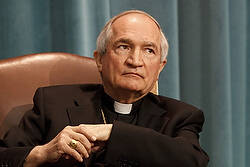The global financial crisis and the worldwide recession it triggered have demonstrated that allowing financial markets to regulate themselves does not serve national interests nor the good of the international community, according to Archbishop Silvano Tomasi, the Vatican’s permanent observer to U.N. agencies based in Geneva. Speaking on April 22 during a U.N. Conference in Doha, Qatar, Archbishop Tomasi said the 2008 financial crisis “marked a turning point for the world economy.” The subsequent global economic recession, he said, “eliminated at least 30 million jobs around the world.” As a result, “the enjoyment of fundamental economic and social rights by countless persons has been compromised, including the right to food, water, decent work, education and health.” He added, “The international community cannot let the financial system continue being a source of global economic instability; it must urgently take measures to prevent the outbreak of other financial crises in the future.”
Market Mayhem
Show Comments (
)
Comments are automatically closed two weeks after an article's initial publication. See our comments policy for more.
The latest from america
Fears of state espionage are surfacing again for Centro Prodh and other human rights groups in Mexico after legislators overhauled a suite of laws in security, military, telecommunications and intelligence matters.
We need to pray for the person whose real identity and full story we do not know. Because that is everyone.
Drama can teach us active listening and public speaking, yes; but on a deeper level, it can shape our spiritual disposition.
“Unless there is a change to current practice, our community is slowly being strangled,” said the Rev. Aaron Wessman, vicar general and director of formation for the Glenmary Home Missioners, a small Catholic order ministering in rural America.








